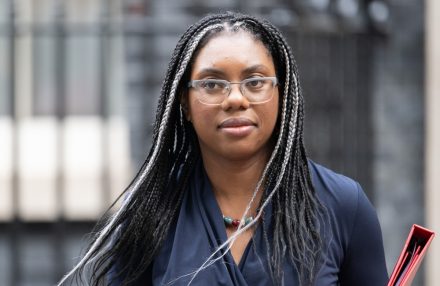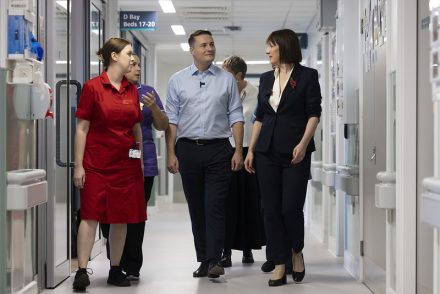
Despite the new Labour government having only been in office for just over six months, the party has suffered a sizeable hit in the polls – with one recent poll suggesting a quarter of Labour voters regret backing them at the general election.
Some recent polls have even suggested Labour would be on course to lose around 200 seats if an election were held now. Pollsters More in Common argue some of the government’s recent decisions have been as damaging as Partygate, while YouGov has said Labour has started the year with its lowest government approval to date.
LabourList has interviewed several leading pollsters to unpack what could be behind the government’s polling challenges, where the party’s votes are going – and what Keir Starmer could about it.
Slump across multiple polls
Pollsters are almost unanimous on the size of the slump Labour has seen since the general election, with a drop of around seven percentage points over the last six months.
Chris Hopkins, political research director for Savanta, said that the “pretty steep” drop is not one that would be anticipated from a new government with its main opposition still in some disarray.
“We would surmise at this point that the electorate didn’t vote for the Labour Party en masse with a huge amount of enthusiasm, but they did believe that they would best manage a very tricky period for the UK.
“I think, despite the low expectations set by Labour during the campaign, the public still feel let down and a bit disappointed.”

Luke Tryl of More in Common said that Labour’s latest polling woes are made more significant by the fact that the party’s election victory was built on a relatively low share of the vote.
“The flip side of that very efficient win that they got is it doesn’t take much to suddenly start looking like things are a bit more dicey,” he said.
Ministers’ personal ratings take a hit too
It is not only the party’s popularity that has taken a dip, but also Keir Starmer’s personal popularity too, which has plunged since he entered Number 10.
Hopkins said: “Six months into a new government, given the platform he was elected on, I would not have expected it to plummet quite as severely as it has.
READ MORE: Minister ‘disappointed’ by poll claiming one in four Labour voters regret backing party
“It does seem to have plateaued somewhat – I don’t think that’s cause for celebration, but I think that is cause not to panic just yet.”
While other members of the Cabinet have also seen the dip in their approval ratings level off, there is one notable exception – the Chancellor, Rachel Reeves.
“I do wonder if the public will use her as the scapegoat for their ire towards the party rather than the leader,” Hopkins said.
Popular policies – but not cutting through enough
What is behind Labour’s slump in the polls? Tryl said that it is not all down to Labour’s challenges in government, but also because of the more volatile nature of the British electorate.
“I think we have an electorate which is increasingly miserable and impatient, and says ‘we want change’, and is expecting change more quickly. One of our trackers shows that basically by two to one, people are more likely to say this government is ‘more of the same’ than ‘real change’.”
“There have been some avoidable mistakes – some of which are bad in and of themselves, and others which I think have slightly drowned out the more positive things Labour have done.”
Tryl said that elements of Labour’s policy agenda so far have proved popular, such as the minimum wage increase, but there are also a number of policies that have not been well communicated to voters, such as renters’ rights, employment rights and GB Energy.
“When you tell people about them, they score well but they haven’t really cut through.”
Worth saying a lot of Labour’s policy agenda so far is quite popular – Sewage Bill, GB Energy, Employment and renters rights, but apart from the minimum wage increase they haven’t had the same cut through as less popular policies – farmers hit, winter fuel, NICs. pic.twitter.com/lsBn36Ofi5
— Luke Tryl (@LukeTryl) December 16, 2024
Winter fuel cuts’ long-lasting damage
However, Tryl said there are three or four policies that have had high cut through with the public that are extremely unpopular, with the means testing of the winter fuel allowance being the “most totemic” of these, along with changes to farmers’ inheritance tax and national insurance rises for employers.
Polling by More in Common last month found that more than half of voters thought taking the winter fuel allowance from pensioners was more damaging than the Partygate scandal that engulfed Boris Johnson’s Conservative government.
READ MORE: Anas Sarwar’s key SNP attack lines as he fires starting gun for 2026 Holyrood election
“They seem to target quite popular constituencies. If you want to talk about three groups that can elicit public sympathy, pensioners, farmers and small businesses would be top of my list.”
Tryl also highlighted issues with the government’s communication of certain controversial decisions and said: “I do think announcing the winter fuel cut into a void where you had nothing either side of it was a mistake – because for lots of people that’s become the defining policy.”
‘I don’t think there’s a huge appreciation of quite what a mess the Tories left the country in’

Christabel Cooper of Labour Together, the Starmerite campaigning think tank that played a key part in Labour’s election win, said that it would be “silly” to pretend that the first six months of the government hadn’t been “hard going”.
She said: “Labour was elected on a platform of change, and when we have done focus groups and looked at public opinion, I think what comes across is people really expected that change to be pretty immediate and then have been disappointed that it hasn’t been.
“What I find really striking is that I don’t think there’s a huge appreciation of quite what a mess the Tories left the country in.
“For instance, people are not happy about the fact prisoners are being released early and that’s understandable, but it’s literally 14 years of failing to deal with the problem that the Tories knew was coming and then just handing it straight to Labour. I guess in that context, I am not altogether surprised that we are where we are in the polls.”
Who are voters turning to?
If some of the voters who backed Labour six months ago are now saying they wouldn’t back the party now, who are they turning to instead? More in Common’s recent polling of voters who regret backing Labour found that just shy of a third (28 percent) would vote for Reform, with a fifth backing the Liberal Democrats, 17 percent the Conservatives and 15 percent who remain unsure.
“The problem is it all adds up very quickly when you start from a low base, and when you’ve got Reform also taking votes from the Tories, you’re in a world of two parties in the high 20s, one in the low to mid 20s, and two around ten percent.”
‘Three-quarters of Labour voters remain loyal’
Despite this, Damian Lyons Lowe, founder and chief executive of Survation, said that Reform’s new voters are still primarily coming from the Conservatives rather than Labour.
He said: “Labour’s vote share problems are not a factor of a ‘Reform specific effect’. The party is leaking its 2024 vote as much to the Conservatives (seven percent) as to Reform (seven percent), with the Liberal Democrats and the Greens picking up three to four percent each. Nevertheless, three-quarters of Labour’s 2024 voters remain loyal.”
Cooper argued that, while it should be taken seriously, the threat to Reform from Labour is “overblown”.
“If you take everybody who would even just consider voting Reform at the moment, you get to around 25 percent of the population. Reform, in the end, are a very socially conservative and fairly economically right-wing party. That’s the core of their vote – there’s only so many voters that share that ideology and, at the moment, they are still taking more votes from the Conservatives than they are from Labour.”
Cooper also said that Reform taking more votes from the Tories could end up benefitting Labour, helping to shore up some of the party’s most vulnerable seats against the Conservatives.
READ MORE: Labour’s most marginal seats against Reform UK
‘Pre-election we’d have said ignore progressive voters – but now Labour can’t afford to’

Hopkins argued that the bigger threat for Labour does not come from Reform, but rather from the Liberal Democrats and from the Green Party.
“Ultimately, now Labour are in government, they are going to face a battering from both sides. As Rishi Sunak found out, threading that electoral coalition needle is nigh on impossible. You’ve got to concentrate on one; either keeping ex-Conservative voters or winning back those from the Greens and the Liberal Democrats.
“I think Labour’s more comfortable doing the latter, but it’s electoral victory came from almost letting the latter go and concentrating on winning those Conservative voters. In Labour-Conservative marginals, which let’s not forget still make up the majority of constituencies, each vote that switches between both parties counts double.
“The threat on the left is real, with the danger of the left vote splitting and maybe letting a resurgent Conservative Party or Reform UK win a constituency. That is something Labour are going to have to address.
“I think a Labour message of ‘Vote Green, Get Farage’ could really be quite powerful – that could be the reality Labour faces unless it can both keep hold of the Conservative voters that it won and delivered a huge majority and also keep its left coalition as strong as it can.”
READ MORE: Which Labour MPs are most at risk from independents, Greens and the Workers Party?
Tryl said: “Up until the election our advice would always have been to ignore your progressive wing because they are going to stick with you and they’re often out of line with the wider public. However, it is now clear Labour can’t afford to just ignore them because you’re not just bleeding votes on the right, you’re bleeding votes on the left.
“I think that is why you’ve got to have some kind of red meat – the minimum wage, renters rights and employment rights are all up there.”
‘The Tories remain the real challenge’

For all the talk of the threat of Reform or the Greens, Tryl makes it clear that Labour’s biggest threat remains the one it has been for decades – the Conservatives.
“Long term, the biggest threat, assuming they don’t get eclipsed by Reform, comes from the Tories, just because of the way the electoral geography works.”
Tryl states that, even if Labour were to “stand still” in polling, they risk at least losing their majority in a variety of possible circumstances; including if the Tories regain Reform votes, if Reform were to cannibalise the Conservative vote in seats where Reform placed second to Labour, or if the Greens gain enough Labour voters to flip seats in the Conservatives’ favour.
“If the Greens start eating two or three percent more of their vote in marginal seats, you’ve then got a reverse Reform effect going on.”
‘Labour’s strategy was designed for 2010. It needs a story beyond cleaning up the Tories’ mess’
While governments elected for the first time have traditionally gone on to win a second term (such as in 2015, 2001 and 1982), the volatile nature of politics, not just in Britain but globally, makes such a circumstance less of a certainty than it once was.
With that in mind, what would pollsters’ top tips be for ways to reverse some of their recent polling woes?
Tryl suggests the government should adopt a three-pronged approach; storytelling, delivery and respect.
“One of the main theses I have is that Labour came in and executed a strategy designed for 2010 – which was making some unpopular decisions. It’s fine as long as the brand of their opponents is tarnished and trashed more.
“However, the election produced a landscape which is totally different to 2010. There has to be a bit of recognition of the new reality that they’re in and telling a story of these decisions, which isn’t just ‘we’re cleaning up the Tories’ mess’. It’s that extra step of explanation: ‘We’re doing X, for Y, which will lead to Z’.
Three priorities: NHS waiting lists, the cost of living and immigration

Tryl added: “Clearly, that would be nothing if there isn’t delivery to underpin. The three tests for Labour in 2029 are: can people get an operation when they need it, can they do the weekly shop without having to put stuff back at the end of it, and does migration look like it’s under control.
“Delivery alone isn’t enough, of course. I’m, for instance, a big fan of the shift from targeting growth to targeting living standards – because you can grow off the City of London, but you could have huge parts of the country which feel left behind and neglected.
“I know Labour don’t like the Tories’ ‘levelling up’ but I think they need to find their own version of it. Angela Rayner is ideally suited to sell – she has a credibility that lots of politicians don’t.
“That’s how you stop populism. You could have a booming economy and still have populists if parts of the country aren’t sharing in it.
For more from LabourList, follow us on Bluesky, Threads, X, Facebook, Instagram or WhatsApp.
SIGN UP: Get the best daily roundup and analysis of Labour news and comment in our newsletter
- SHARE: If you have anything to share that we should be looking into or publishing about this story – or any other topic involving Labour– contact us (strictly anonymously if you wish) at [email protected].
- SUBSCRIBE: Sign up to LabourList’s morning email here for the best briefing on everything Labour, every weekday morning.
- DONATE: If you value our work, please donate to become one of our supporters here and help sustain and expand our coverage.
- PARTNER: If you or your organisation might be interested in partnering with us on sponsored events or content, email [email protected].




More from LabourList
‘Council Tax shouldn’t punish those who have the least or those we owe the most’
Two-thirds of Labour members say government has made too many policy U-turns, poll reveals
‘Two states, one future: five steps on the path to peace for Israelis and Palestinians’